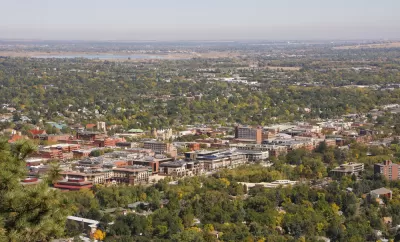The New York Times devotes significant ink to an argument against the use of zoning laws as tools of anti-growth politics.

[Updated 7/6/2017] The headline of a recent article by Conor Daugherty argues a strong claim about planning politics: "Anti-Growth Sentiment, Reflected in Zoning Laws, Thwarts Equality."
The article begins in Boulder, using Steve Pomerance, a former city councilmember that moved to Boulder in the 1960s, as an example of anti-growth advocate. Pomerance, according to Dougherty's description, believes that all of Boulder's charms are under threat: "Rush-hour traffic has become horrendous. Quaint, two-story storefronts are being dwarfed by glass and steel. Cars park along the road to the meadow."
Daugherty offers a counterpoint to those traditional anti-growth political stances: "a growing body of economic literature suggests that anti-growth sentiment, when multiplied across countless unheralded local development battles, is a major factor in creating a stagnant and less equal American economy."
That growing body of research includes a study by Peter Ganong and Daniel Shoag from January 2015, titled "Why Has Regional Income Convergence in the U.S. Declined?" [pdf]. Their work was also picked up by the White House Council of Economic Advisers last year, as the Obama Administration made its first attempt to debunk land use regulations as a tool of social and economic injustice. Daugherty also includes work by Chang-Tai Hsieh and Enrico Moretti [pdf] in the survey of research detailing the consequences of the zoning status quo.
[The photo caption was corrected above.]
FULL STORY: How Anti-Growth Sentiment, Reflected in Zoning Laws, Thwarts Equality

Alabama: Trump Terminates Settlements for Black Communities Harmed By Raw Sewage
Trump deemed the landmark civil rights agreement “illegal DEI and environmental justice policy.”

Study: Maui’s Plan to Convert Vacation Rentals to Long-Term Housing Could Cause Nearly $1 Billion Economic Loss
The plan would reduce visitor accommodation by 25% resulting in 1,900 jobs lost.

Planetizen Federal Action Tracker
A weekly monitor of how Trump’s orders and actions are impacting planners and planning in America.

Wind Energy on the Rise Despite Federal Policy Reversal
The Trump administration is revoking federal support for renewable energy, but demand for new projects continues unabated.

Passengers Flock to Caltrain After Electrification
The new electric trains are running faster and more reliably, leading to strong ridership growth on the Bay Area rail system.

Texas Churches Rally Behind ‘Yes in God’s Back Yard’ Legislation
Religious leaders want the state to reduce zoning regulations to streamline leasing church-owned land to housing developers.
Urban Design for Planners 1: Software Tools
This six-course series explores essential urban design concepts using open source software and equips planners with the tools they need to participate fully in the urban design process.
Planning for Universal Design
Learn the tools for implementing Universal Design in planning regulations.
Caltrans
Smith Gee Studio
Institute for Housing and Urban Development Studies (IHS)
City of Grandview
Harvard GSD Executive Education
Toledo-Lucas County Plan Commissions
Salt Lake City
NYU Wagner Graduate School of Public Service





























